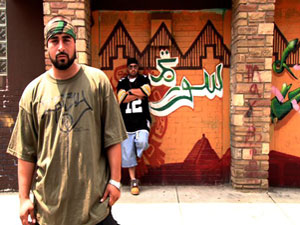–Staff Writer–

(FinalCall.com) – What’s cool about being a Muslim? Is anything about Islam cool? Was Malcolm X ? What about Muhammad Ali and the Honorable Minister Louis Farrakhan? Are they considered cool?
In the recently released documentary “New Muslim Cool,” the foundation laid by the Honorable Elijah Muhammad of spreading Islam in America is expanded upon as the intersection between Islam and hip hop culture is revealed in the life of Hamza Perez.
The film debuted June 23, on PBS and gives audiences an insider’s view of what young people know as the fusion between Muslims and street beats that have been developing since the beginnings of hip-hop culture.
The result is a surprising challenge to stereotypes of both Muslims and urban youth in America that encourages viewers to look critically at the so-called “clash of civilizations” between Islam and the West.
“New Muslim Cool came out of my long-standing interest in the power of pop music and culture to create social change and a deep feeling that we urgently need to look for common ground as our world grows increasingly diverse and interconnected,” said producer Jennifer Maytorena Taylor.
“This is a story about who we all are as a country, making choices about our deepest values in tough times and continually redefining what it means to be American.”
The movie is also the story of a man coming of age, facing his deepest questions about his faith, trying to keep his family safe and learning how to hold himself accountable.
A decade ago, Hamza Pérez, born Jason, was an urban drug dealer. The child of Puerto Rican parents, he had two recurring, competing dreams at night: in one he was in prison by age 21, and in the other he was dead.
New Muslim Cool is the story of how, as Hamza laughingly puts it, “both [dreams] came true,” albeit in unpredictable ways.
Indeed, when Hamza was 21, he was hanging out with friends and getting high when a chance encounter with an “old sheikh” transformed his life. The death he experienced was “a death of all my past, the negative,” he says.
He gave up drugs and the street life and converted to Islam. He then went further, becoming active in forming a community of Latino and Black Muslims, many of whom, like Hamza, were former street hustlers and drug dealers.
The community ultimately moved from Massachusetts to Pittsburgh, Pa., with Hamza bringing along his son and, after the breakup of his first marriage, his daughter.
That is the history of the Nation of Islam, finding the rejected and the despised and giving them a new start, a new life.
“My job was to make sure everyone understood the history of Islam in America and Black people’s role. The people who made Muslims cool in America were the followers of the Honorable Elijah Muhammad,” said movie consultant Zaheer Ali who is also a Ph.D student at Columbia University.
“Politically, culturally, athletically and economically, that space was created by the teachings of the Honorable Elijah Muhammad. The film makes references to themes and traditions like social justice and prison ministries. The Nation of Islam frames the context of this story. I wanted to make sure that was properly represented.”
As part of their efforts to build a community that would reconcile their heritage with their new faith, Hamza and his brother, SulÃman, formed the rap group Mujahideen Team (M-Team).
M-Team strives to use knowledge gained in the streets to put Islam’s religious message into a familiar context. Ultimately, Hamza took that message to prisons, fulfilling his other dream in a way he had never imagined.
In the film, Hamza and his brother SulÃman laugh about the exotic hybridization their faith and community embody. “See, we don’t speak full Arabic,” says Hamza, “but we know Arabic Spanglish Ebonics.”
The two men’s conversion bewildered their family, who raised them as Roman Catholics. The family’s initial upset has been tempered by gratitude that the brothers’ new faith has gotten them off drugs and away from street life. Yet the family also feels some discomfort over the tough lyrics M-Team uses.
When asked what he enjoyed most about making the film Hamza told The Final Call, “I enjoyed watching my mother and grandmother watch the film. They talk through the movie until it gets to their part and they tell people to be quiet, the real stars are coming on. I laugh at them watching it.”
Within the Muslim hip-hop world, M-Team is recognized as heirs to the tradition of artists like the Last Poets and Public Enemy, freely criticizing the government and many elements of modern society.
“New Muslim Cool transcends race, ethnicity, class and religion. Like hip-hop culture, the film is all about irrepressible social transformation and empowerment,” said Dr. Benjamin Chavis, Hip-Hop Summit Action Network.
(For clips, info about those in the film, or to host a community screening, visit www.newmuslimcool.com.)












